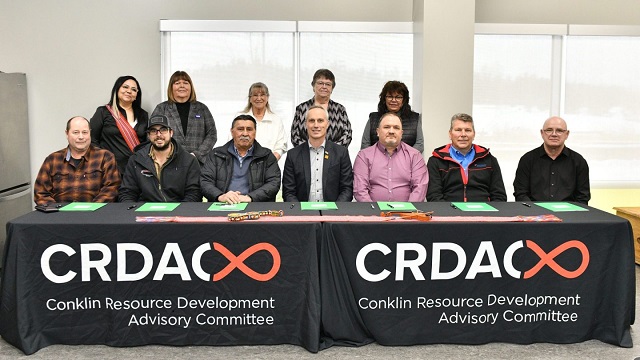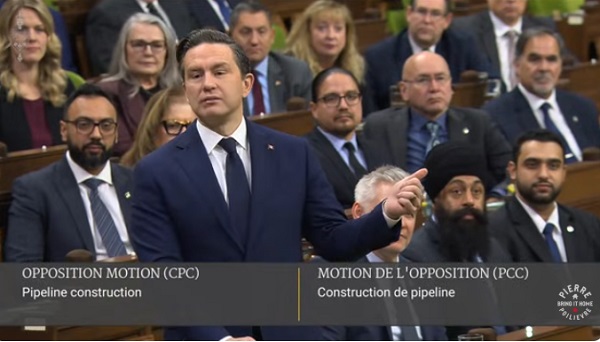Alberta
Northern Alberta Métis community launches seven new oil sands partnerships to boost economic opportunity

L-R (seated): Great Northern Bridgeworks president Steve Ross, Enviromulch Mulching & Logging superintendent Phil Mamers, Lynco Energy Services owner Doug Golosky, Surerus Murphy Joint Venture chairman Sean Surerus, Brothers HDD owner Jamie McClennon, Gateway Mechanical Services account executive Dean Seiz, Dorval O & M Services owner Brent Dorval (sitting in for Global Fusion Coating general manager Chad Olsen). L-R (standing): CRDAC directors Stacey Atkinson, Valerie Quintal, Shirley Tremblay, Margaret Quintal, and Grace Richards. Photo courtesy CRDAC
From the Canadian Energy Centre
About 150 kilometres south of Fort McMurray, the Conklin region is responsible for nearly 1/3 of oil sands production
The predominantly Métis community of Conklin has launched seven new business partnerships in a bid to lift its opportunities in one of Alberta’s busiest oil sands regions.
From drilling to heavy machinery and pipelines, the new ventures will bring an economic and social boost to the community of 300 residents about 150 kilometres southeast of Fort McMurray.
“We’d like to focus more on getting local opportunities such as training, employment, maybe some subcontracting, to build the local businesses up and build our people up for local employment,” said Valerie Quintal, president of Conklin Métis Local 193.
“We are going to be planning with each one of them how we could better serve our community members.”
Quintal is also a director of the Conklin Resource Development Advisory Committee (CRDAC), which brokered the deals with companies including Brothers HDD, Gateway Mechanical Services and Surerus-Murphy Joint Venture.
CRDAC was established in 2008 to help the community engage with growing oil sands development in the Conklin region, said CEO Scott Duguid.
The area has become a hub for development using a technology called steam assisted gravity drainage (SAGD), which involves drilling horizontal well pairs and steam injection to produce oil sands crude.
“It was really developed when a lot of the SAGD development was in the application or the environment assessment phase and there was a huge push for regulatory consultation and engagement with government on regulatory applications for SAGD,” he said.

Métis cultural heritage is displayed alongside a map of development activity in the Conklin region. Photo courtesy CRDAC
The area around Conklin is now home to six major oil sands projects owned by the industry’s biggest producers. This includes Cenovus Energy’s Christina Lake facility, the largest so-called “in situ” project in the oil sands.
As of January 2024, the region produced more than 550,000 barrels per day, or nearly one-third of all oil sands production, according to the Alberta Energy Regulator.
CRDAC has partnerships in place with the big players in the region including Cenovus, Canadian Natural Resources and MEG Energy, Duguid said (including a unique home construction program with Cenovus).
But the new ventures take opportunity to the next layer, with companies that service or work for oil sands producers, he said.
Duguid said the group has partnerships in place with the big players in the region such as Cenovus, MEG, CNRL, and Harvest.
“There’s a fair amount of wealth being generated in the region and out of the South Athabasca oilsands. There’s a lot of work happening,” said Duguid.
“We as sort of a community representative organization are trying to put our hands up with some of these smaller industry players and saying ‘hey, we’re here, we have community members, we have a potential workforce, we may need training, we may need some capacity to ensure that our residents can be meaningfully employed, but we can work with you and for you.’”
The hope is that partnering with these mid-level businesses will provide an opportunity for grassroots Conklin businesses to grow, he said.
Some of the revenue from the partnerships will come back to the community to support social programs such as healthcare, housing, and substance abuse treatment.
“It’s hugely significant for the community,” Duguid said.
Gateway Mechanical Services’ Dean Seiz said the company reached out to CRDAC last year to see if they would be interested in a working relationship.
“Basically, the long-term goal is to see if there are any community members that would be interested in maybe getting into the trades that Gateway does,” Seiz said.
The company, with its head office in Edmonton, provides heating, ventilation and air conditioning (HVAC), plumbing and refrigeration services across Western Canada. It has nine locations for regional offices with about 275 technicians.
“It’s a work in progress with Scott [Duguid] and the community to see what’s important to the community to make things work,” Seiz said.
Alberta
They never wanted a pipeline! – Deputy Conservative Leader Melissa Lantsman

From Melissa Lantsman
Turns out the anti-development wing of the Liberal Party never stopped running the show.
Today, we’ll see if the Liberals vote for the pipeline they just finished bragging about.
Spoiler: they won’t. Because with the Liberals, the announcements are real, but the results never are.
Alberta
Premier Smith: Canadians support agreement between Alberta and Ottawa and the major economic opportunities it could unlock for the benefit of all

From Energy Now
By Premier Danielle Smith
Get the Latest Canadian Focused Energy News Delivered to You! It’s FREE: Quick Sign-Up Here
If Canada wants to lead global energy security efforts, build out sovereign AI infrastructure, increase funding to social programs and national defence and expand trade to new markets, we must unleash the full potential of our vast natural resources and embrace our role as a global energy superpower.
The Alberta-Ottawa Energy agreement is the first step in accomplishing all of these critical objectives.
Recent polling shows that a majority of Canadians are supportive of this agreement and the major economic opportunities it could unlock for the benefit of all Canadians.
As a nation we must embrace two important realities: First, global demand for oil is increasing and second, Canada needs to generate more revenue to address its fiscal challenges.
Nations around the world — including Korea, Japan, India, Taiwan and China in Asia as well as various European nations — continue to ask for Canadian energy. We are perfectly positioned to meet those needs and lead global energy security efforts.
Our heavy oil is not only abundant, it’s responsibly developed, geopolitically stable and backed by decades of proven supply.
If we want to pay down our debt, increase funding to social programs and meet our NATO defence spending commitments, then we need to generate more revenue. And the best way to do so is to leverage our vast natural resources.
At today’s prices, Alberta’s proven oil and gas reserves represent trillions in value.
It’s not just a number; it’s a generational opportunity for Alberta and Canada to secure prosperity and invest in the future of our communities. But to unlock the full potential of this resource, we need the infrastructure to match our ambition.
There is one nation-building project that stands above all others in its ability to deliver economic benefits to Canada — a new bitumen pipeline to Asian markets.
The energy agreement signed on Nov. 27 includes a clear path to the construction of a one-million-plus barrel-per-day bitumen pipeline, with Indigenous co-ownership, that can ensure our province and country are no longer dependent on just one customer to buy our most valuable resource.
Indigenous co-ownership also provide millions in revenue to communities along the route of the project to the northwest coast, contributing toward long-lasting prosperity for their people.
The agreement also recognizes that we can increase oil and gas production while reducing our emissions.
The removal of the oil and gas emissions cap will allow our energy producers to grow and thrive again and the suspension of the federal net-zero power regulations in Alberta will open to doors to major AI data-centre investment.
It also means that Alberta will be a world leader in the development and implementation of emissions-reduction infrastructure — particularly in carbon capture utilization and storage.
The agreement will see Alberta work together with our federal partners and the Pathways companies to commence and complete the world’s largest carbon capture, utilization and storage infrastructure project.
This would make Alberta heavy oil the lowest intensity barrel on the market and displace millions of barrels of heavier-emitting fuels around the globe.
We’re sending a clear message to investors across the world: Alberta and Canada are leaders, not just in oil and gas, but in the innovation and technologies that are cutting per barrel emissions even as we ramp up production.
Where we are going — and where we intend to go with more frequency — is east, west, north and south, across oceans and around the globe. We have the energy other countries need, and will continue to need, for decades to come.
However, this agreement is just the first step in this journey. There is much hard work ahead of us. Trust must be built and earned in this partnership as we move through the next steps of this process.
But it’s very encouraging that Prime Minister Mark Carney has made it clear he is willing to work with Alberta’s government to accomplish our shared goal of making Canada an energy superpower.
That is something we have not seen from a Canadian prime minister in more than a decade.
Together, in good faith, Alberta and Ottawa have taken the first step towards making Canada a global energy superpower for benefit of all Canadians.
Danielle Smith is the Premier of Alberta
-

 National17 hours ago
National17 hours agoLiberal bill “targets Christians” by removing religious exemption in hate-speech law
-

 Business2 days ago
Business2 days agoThe EU Insists Its X Fine Isn’t About Censorship. Here’s Why It Is.
-

 Business1 day ago
Business1 day agoCanada invests $34 million in Chinese drones now considered to be ‘high security risks’
-

 Bruce Dowbiggin2 days ago
Bruce Dowbiggin2 days agoWayne Gretzky’s Terrible, Awful Week.. And Soccer/ Football.
-

 Business14 hours ago
Business14 hours agoLooks like the Liberals don’t support their own Pipeline MOU
-

 Health2 days ago
Health2 days agoCDC Vaccine Panel Votes to End Universal Hep B Vaccine for Newborns
-

 Economy1 day ago
Economy1 day agoAffordable housing out of reach everywhere in Canada
-

 Crime18 hours ago
Crime18 hours agoInside the Fortified Sinaloa-Linked Compound Canada Still Can’t Seize After 12 Years of Legal War




